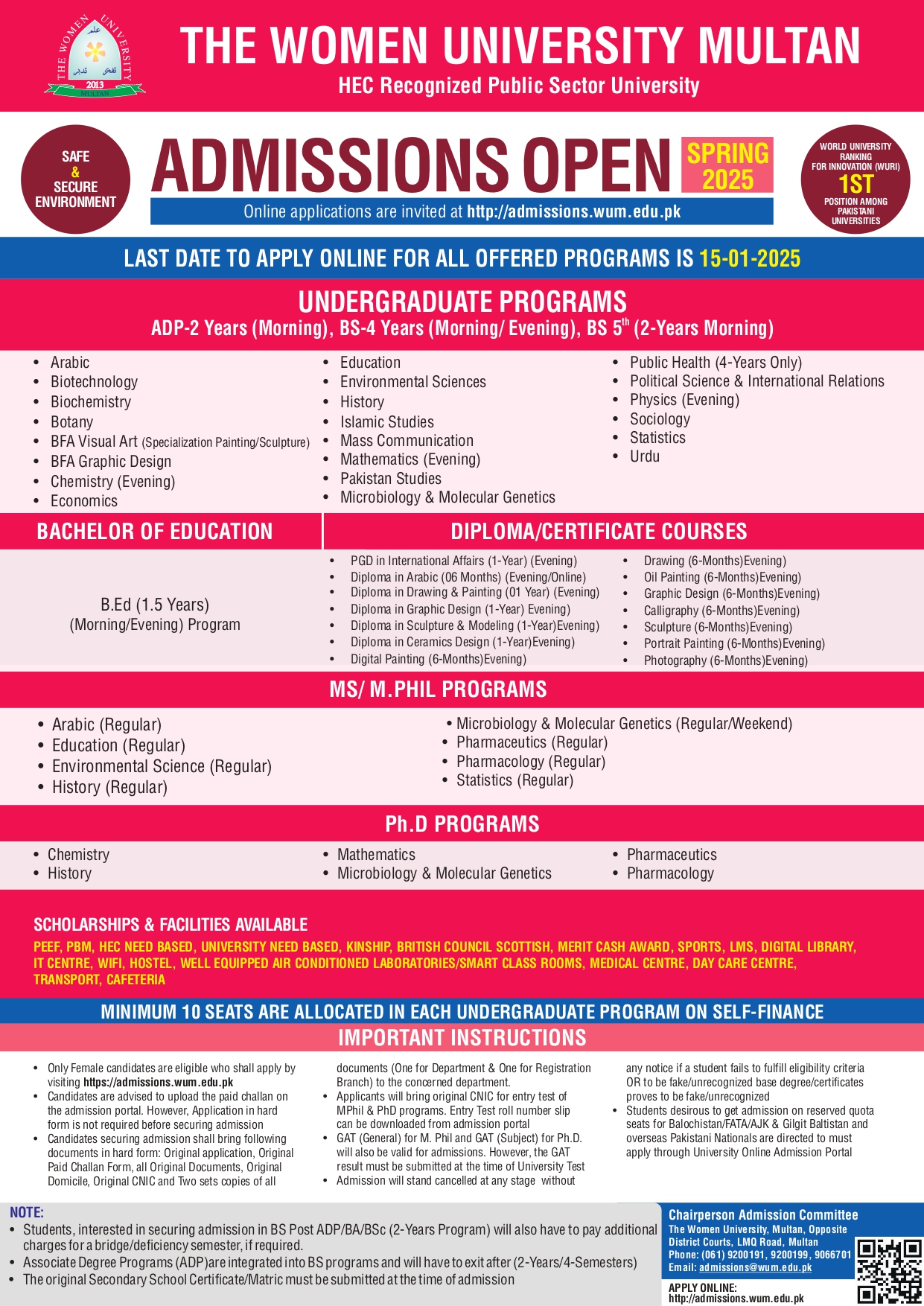

Name: Syed Khurram Shahzad
Designation: Administrative Officer (BPS-17) /Public Information Officer (PIO)
Contact No.: 061-9200812 (Ext.220)/0092-315-5669009/0092-305-7220007
Email: pio@wum.edu.pk/ khurram.shahzad@wum.edu.pk
Public Information Office
The terms 'Right to Information' (RTI) 'and Freedom of Information' (FOI) are conversely utilized however the basic importance is something very similar. – to can get to data. 'Data' as a term has been gotten from the Latin words 'Formation' and 'Forma' which means giving shape to something and framing an example, separately. In any case, the word data in these terms is utilized in a specific context. It indicates to that data which is held by the public authority. The data held by the public authority has a place with people and the public authority and its functionaries are caretakers of this data for the present. It has a place with individuals since it is fundamentally the aggregate of an assortment of realities about individuals and the country.
Right to Information provided below under the Punjab Governance Reforms Service Delivery Program (PGRSD). The Government of the Punjab has executed a progression of measures to reinforce straightforward assistance delivery and citizen satisfaction. The as of late declared Punjab Transparency and Right to Information Act, 2013 and execution of Punjab Public Management Reform Program (PPMRP) are important for the bigger plan to encourage e-administration and e-governance and spread proof-based information, from the Public authority as caretakers of information to the resident citizen – its legitimate proprietors.
The RTI Act unveils it obligatory for the Public Authorities of Punjab to give specified government-held data to the general population. Moreover, the as of late sent off Punjab Public Management Reform Program is one more step towards the objective of transparent governance and straightforward administration. The general population can get to the data in the accompanying two ways; by mentioning for it, known as responsive revelation or getting data without presenting any solicitations, named as proactive disclosure.
The Women University Multan is proactively uncovering the following specified information under Transparency and Right to Information Act, 2013 and PPMR Program. What is the logic of attaching importance to access to information to an extent that it is not only regarded as a fundamental human right but it is also identified as a yardstick to measure other freedoms? Why is freedom of information being considered as a touchstone or a benchmark for other rights and freedoms?
This clearly means that there is corresponding link between the ability to exercise the right to information and the level of the quality of life enjoyed by the citizens. In other words, the assumption is that those who have a greater level of access to information have a better quality of life as compared to those who have lesser level access to information. It also means that right to information does not, in itself, guarantee other basic rights. In other words, it empowers citizens to attain their basic human rights.
This leads to another important question. How level of admittance to information enables individuals to achieve their fundamental basic liberties as well as the other way around? For example, if people know the total budget of a dispensary or of a school in their area, they will demand corresponding quality in the services. Similarly, if they know the total cost to be incurred on the proposed road in their area, they can create public pressure on their representatives and officials if the quality is compromised because of the kickbacks.
In these examples, we find the linkage of right to information with public accountability and democracy. This is the power of the right to information.
Key Responsibilities of Public Bodies
All public bodies must designate Public Information Officers within 30 days of the Act coming into effect, and proactively disseminate information about their contact details through websites, notice-boards and other media. The public information officers are responsible for responding to requests filed by citizens and bear burden of proof with regard to decision on a request for information before Punjab Information Commission. Public Information Officers are also responsible for assisting persons with disabilities in filing request for information.
Information to be proactively disclosed is as under: –
- Particulars of the public body, its functions and duties.
- Powers and functions of its officers and employees.
- Norms and criteria set by the public body for the discharge of its functions.
- Acts, ordinances, rules, regulations, notifications, circulars and other legal instruments being enforced, issued or used by the public body in the discharge of its functions.
- A statement of categories of information being held by the public body.
- A description of its decision-making processes and any opportunities for the public to provide input into or be consulted about decisions.
- A directory of its officers and employees with their respective remuneration, perks and privileges.
- Budget of the public body including details of all proposed and actual expenditures.
- Amount of subsidy and details of beneficiaries if the public body provides any subsidy.
- Particulars of the recipients of concessions, permits or authorizations granted by the public body.
- Facilities available with the public body for obtaining information held by it.
- Name, designation and other particulars of the public information officer of the public body; and
- Any other information that the Government may notify in the official Gazette.
Categories (13) of Pro-Active Disclosure of RTI Act, 2013
Subject to the provisions of this Act, a public body shall proactively disclose: –
- particulars of the public body, its functions, and duties
- powers and functions of its officers and employees;
- norms and criteria set by the public body for the discharge of its functions;
- Acts, Ordinances, rules, regulations, notifications, circulars and other legal instruments being enforced, issued or used by the public body in the discharge of its functions;
- a statement of categories of information being held by the public body;
- a description of its decision-making processes and any opportunities for the public to provide input into or be consulted about decisions;
- a directory of its officers and employees with their respective remuneration, perks and privileges;
- budget of the public body including details of all proposed and actual expenditures;
- amount of subsidy and details of beneficiaries if the public body provides any subsidy;
- particulars of the recipients of concessions, permits or authorizations granted by the public body;
- facilities available with the public body for obtaining information held by it;
- name, designation and other particulars of the public information officer of the public body; and
- any other information that the Government may notify in the official Gazette.
Exceptions U/S 4 of RTI Act, 2013
The right to information is anything but an outright one. There are sure cases in which the public authority may not impart the information to the resident citizens. This sort of information is put under the 'exceptions' class and all the RTI regulations established by various countries have this classification. For instance, the data relating to the authentic security worries of the state may not be pronounced to general society. In view of real worries, the public authority may not provide information under section 13 of the Transparency & Right to Information Act 2013. A public information officer may refuse an application for access to information where disclosure of the information shall or is likely to cause harm to:
The right to information is everything except a through and through one. There are certain cases where the public authority may not grant the data to the resident citizen. This kind of data is put under the 'special cases or exceptions' class and all the RTI guidelines laid out by different nations have this order. For example, the information connecting with the legitimate security worries of the state may not be articulated to general society. Considering genuine concerns, the public authority may not provide data or information under Section 13 of the Transparency and Right to Information Act 2013. A Public Information Officer may refuse an application for access to data / information where divulgence of the data will or is probably going to harm:
- national defence or security, public order or international relations of Pakistan
- a legitimate privacy interest, unless the person concerned has consented to disclosure o the information
- the protection of legally privileged information or of the rules relating to breach of confidence
- the life, health or safety of any person
- the prevention or detection of crime, the apprehension or prosecution of offenders, or the administration of justice
- the ability of the Government to manage the economy; or
- the effective formulation of or success of a policy either by its premature disclosure or by restraining the free and frank provision of advice within the Government
Notwithstanding anything contained in subsection (1), if the Commission determines that the public interest in such disclosure outweighs the harm that shall or is likely to be caused by such disclosure, it may direct the public information officer to provide the information.
Where a part of a document is covered by an exception in subsection (1) any information in the document which is not covered by an exception shall be disclosed if it is reasonably severable from the rest of the document
Where the information is refused, the public information officer shall, within the time-limit specified under section 10, inform the applicant specifying: –
- the reasons on account of which and the provision of this Act under which the requested information is refused
- procedure for internal review or complaint against the decision; and
- name and designation of the person who may provide full or limited access to the exempted information.
However, it does not necessarily mean that the government can deny access to information to the public by merely referring to any of these areas. Notwithstanding anything contained in this section, any information mentioned in subsection (1) may be disclosed by a Public Information Officer if the information is more than fifty years old but the Commission may, in an appropriate case on application of a public body or otherwise, extend this time period of fifty years to a further twenty years.

